Recovery Focused Nursing Care Plans
VerifiedAdded on 2022/09/08
|7
|1960
|37
AI Summary
Contribute Materials
Your contribution can guide someone’s learning journey. Share your
documents today.
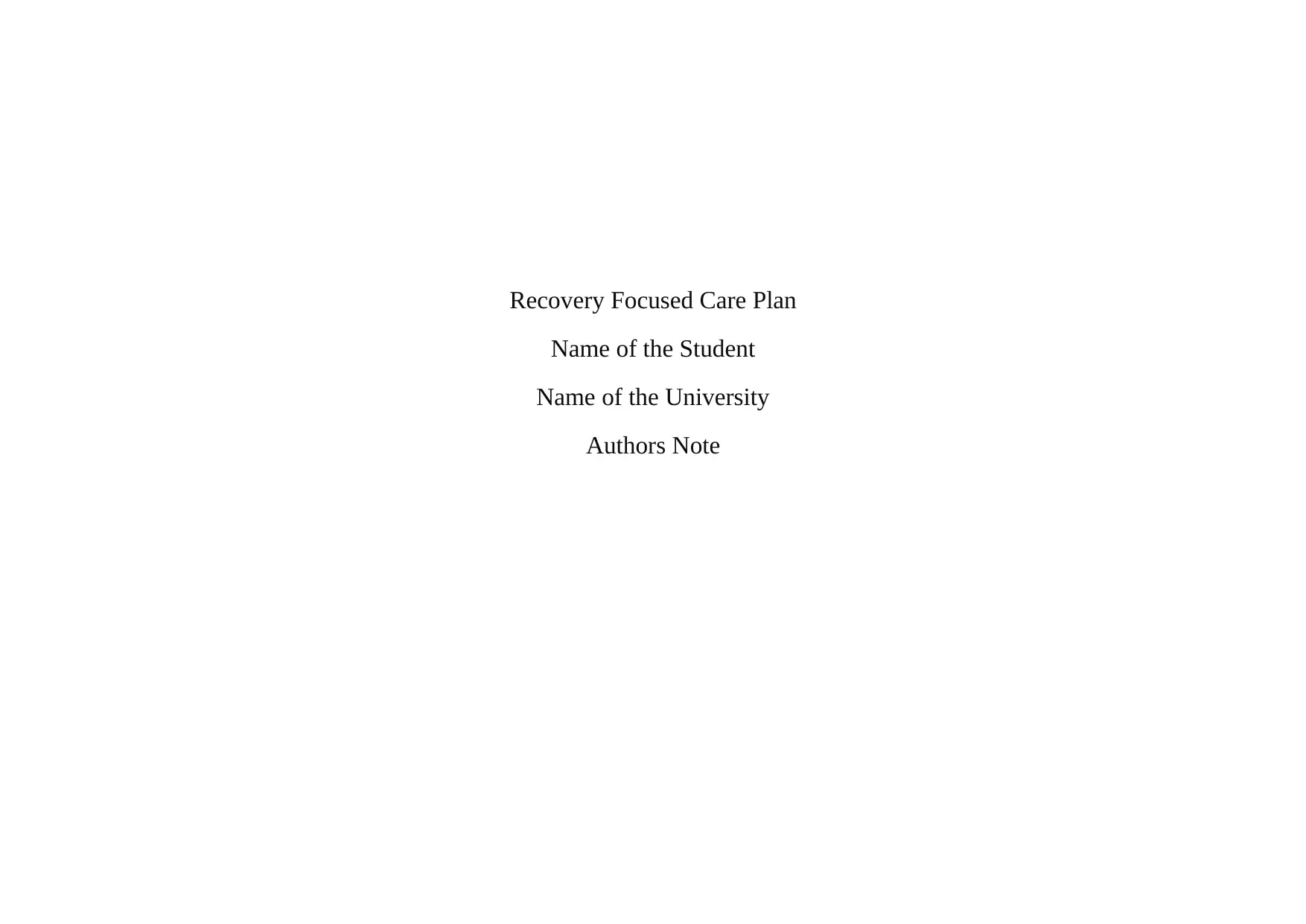
Recovery Focused Care Plan
Name of the Student
Name of the University
Authors Note
Name of the Student
Name of the University
Authors Note
Secure Best Marks with AI Grader
Need help grading? Try our AI Grader for instant feedback on your assignments.
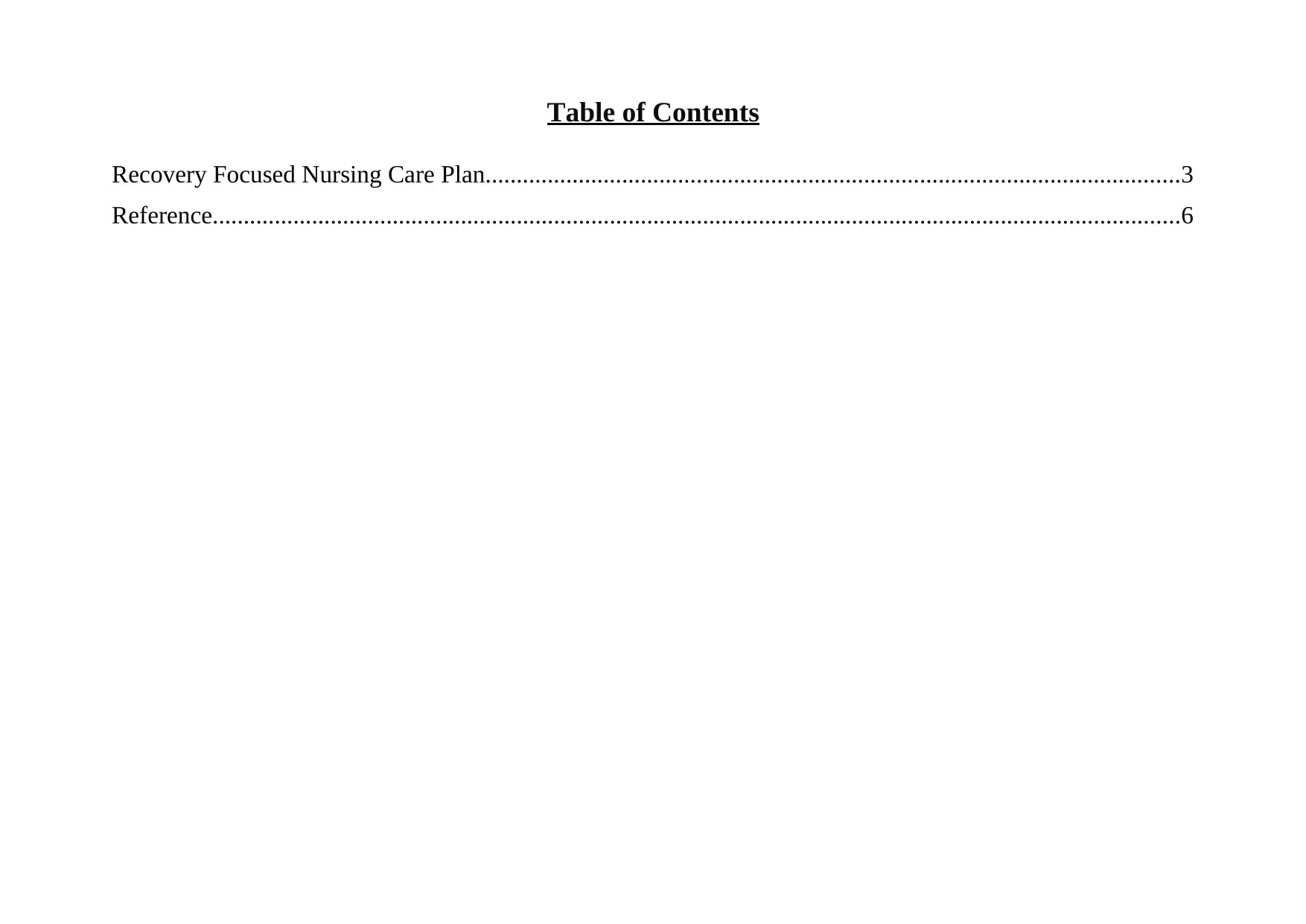
Table of Contents
Recovery Focused Nursing Care Plan................................................................................................................3
Reference............................................................................................................................................................6
Recovery Focused Nursing Care Plan................................................................................................................3
Reference............................................................................................................................................................6
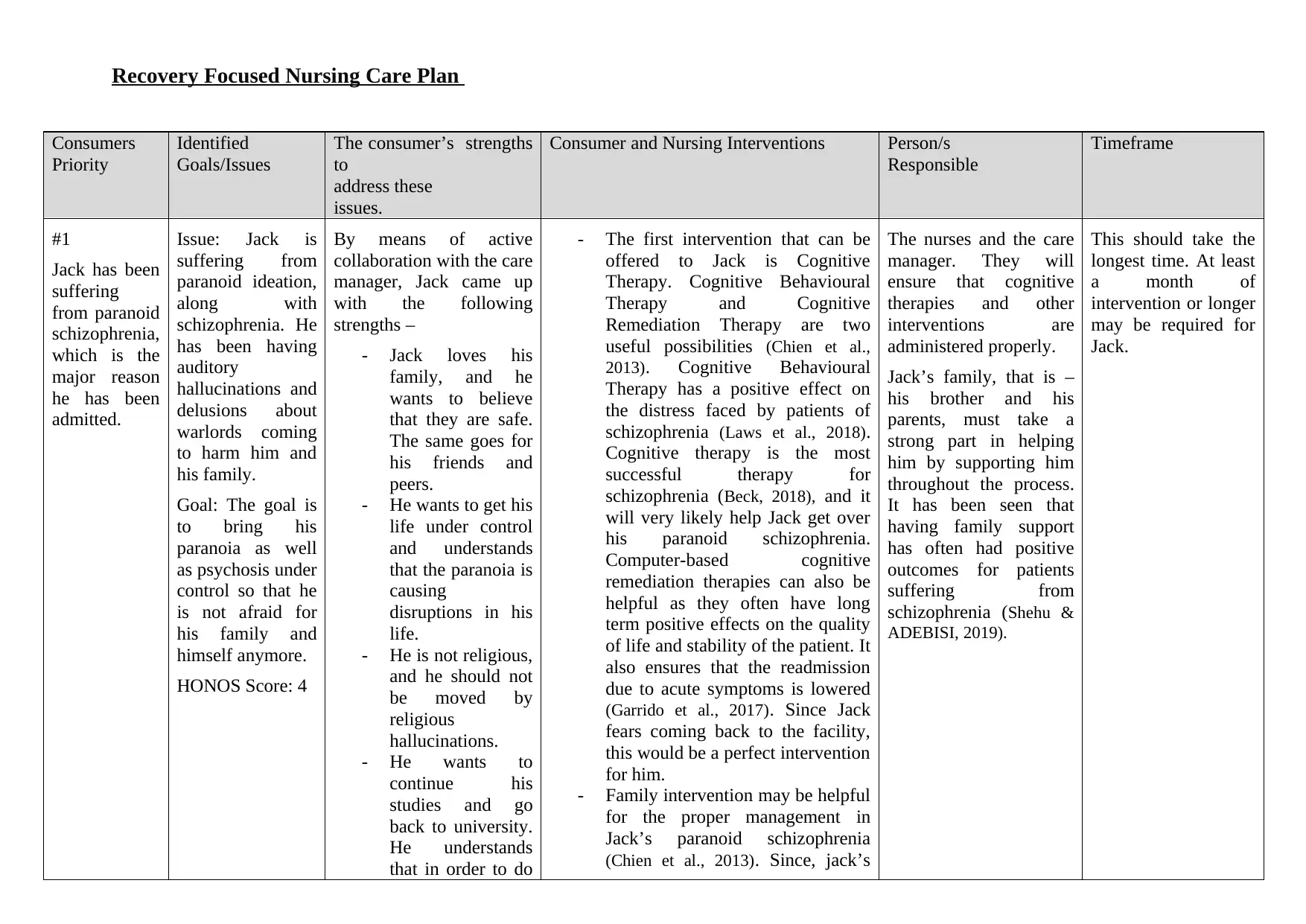
Recovery Focused Nursing Care Plan
Consumers
Priority
Identified
Goals/Issues
The consumer’s strengths
to
address these
issues.
Consumer and Nursing Interventions Person/s
Responsible
Timeframe
#1
Jack has been
suffering
from paranoid
schizophrenia,
which is the
major reason
he has been
admitted.
Issue: Jack is
suffering from
paranoid ideation,
along with
schizophrenia. He
has been having
auditory
hallucinations and
delusions about
warlords coming
to harm him and
his family.
Goal: The goal is
to bring his
paranoia as well
as psychosis under
control so that he
is not afraid for
his family and
himself anymore.
HONOS Score: 4
By means of active
collaboration with the care
manager, Jack came up
with the following
strengths –
- Jack loves his
family, and he
wants to believe
that they are safe.
The same goes for
his friends and
peers.
- He wants to get his
life under control
and understands
that the paranoia is
causing
disruptions in his
life.
- He is not religious,
and he should not
be moved by
religious
hallucinations.
- He wants to
continue his
studies and go
back to university.
He understands
that in order to do
- The first intervention that can be
offered to Jack is Cognitive
Therapy. Cognitive Behavioural
Therapy and Cognitive
Remediation Therapy are two
useful possibilities (Chien et al.,
2013). Cognitive Behavioural
Therapy has a positive effect on
the distress faced by patients of
schizophrenia (Laws et al., 2018).
Cognitive therapy is the most
successful therapy for
schizophrenia (Beck, 2018), and it
will very likely help Jack get over
his paranoid schizophrenia.
Computer-based cognitive
remediation therapies can also be
helpful as they often have long
term positive effects on the quality
of life and stability of the patient. It
also ensures that the readmission
due to acute symptoms is lowered
(Garrido et al., 2017). Since Jack
fears coming back to the facility,
this would be a perfect intervention
for him.
- Family intervention may be helpful
for the proper management in
Jack’s paranoid schizophrenia
(Chien et al., 2013). Since, jack’s
The nurses and the care
manager. They will
ensure that cognitive
therapies and other
interventions are
administered properly.
Jack’s family, that is –
his brother and his
parents, must take a
strong part in helping
him by supporting him
throughout the process.
It has been seen that
having family support
has often had positive
outcomes for patients
suffering from
schizophrenia (Shehu &
ADEBISI, 2019).
This should take the
longest time. At least
a month of
intervention or longer
may be required for
Jack.
Consumers
Priority
Identified
Goals/Issues
The consumer’s strengths
to
address these
issues.
Consumer and Nursing Interventions Person/s
Responsible
Timeframe
#1
Jack has been
suffering
from paranoid
schizophrenia,
which is the
major reason
he has been
admitted.
Issue: Jack is
suffering from
paranoid ideation,
along with
schizophrenia. He
has been having
auditory
hallucinations and
delusions about
warlords coming
to harm him and
his family.
Goal: The goal is
to bring his
paranoia as well
as psychosis under
control so that he
is not afraid for
his family and
himself anymore.
HONOS Score: 4
By means of active
collaboration with the care
manager, Jack came up
with the following
strengths –
- Jack loves his
family, and he
wants to believe
that they are safe.
The same goes for
his friends and
peers.
- He wants to get his
life under control
and understands
that the paranoia is
causing
disruptions in his
life.
- He is not religious,
and he should not
be moved by
religious
hallucinations.
- He wants to
continue his
studies and go
back to university.
He understands
that in order to do
- The first intervention that can be
offered to Jack is Cognitive
Therapy. Cognitive Behavioural
Therapy and Cognitive
Remediation Therapy are two
useful possibilities (Chien et al.,
2013). Cognitive Behavioural
Therapy has a positive effect on
the distress faced by patients of
schizophrenia (Laws et al., 2018).
Cognitive therapy is the most
successful therapy for
schizophrenia (Beck, 2018), and it
will very likely help Jack get over
his paranoid schizophrenia.
Computer-based cognitive
remediation therapies can also be
helpful as they often have long
term positive effects on the quality
of life and stability of the patient. It
also ensures that the readmission
due to acute symptoms is lowered
(Garrido et al., 2017). Since Jack
fears coming back to the facility,
this would be a perfect intervention
for him.
- Family intervention may be helpful
for the proper management in
Jack’s paranoid schizophrenia
(Chien et al., 2013). Since, jack’s
The nurses and the care
manager. They will
ensure that cognitive
therapies and other
interventions are
administered properly.
Jack’s family, that is –
his brother and his
parents, must take a
strong part in helping
him by supporting him
throughout the process.
It has been seen that
having family support
has often had positive
outcomes for patients
suffering from
schizophrenia (Shehu &
ADEBISI, 2019).
This should take the
longest time. At least
a month of
intervention or longer
may be required for
Jack.
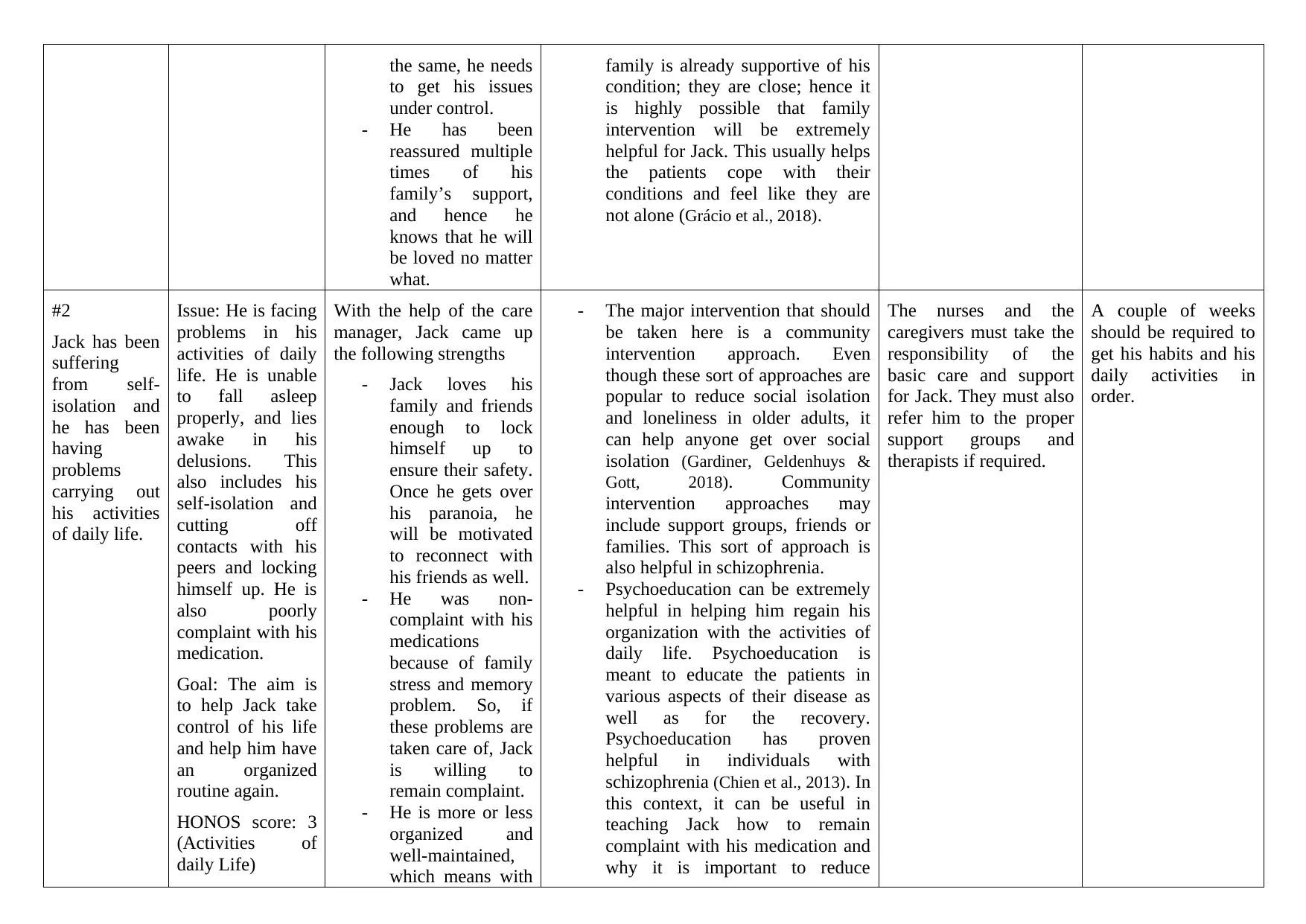
the same, he needs
to get his issues
under control.
- He has been
reassured multiple
times of his
family’s support,
and hence he
knows that he will
be loved no matter
what.
family is already supportive of his
condition; they are close; hence it
is highly possible that family
intervention will be extremely
helpful for Jack. This usually helps
the patients cope with their
conditions and feel like they are
not alone (Grácio et al., 2018).
#2
Jack has been
suffering
from self-
isolation and
he has been
having
problems
carrying out
his activities
of daily life.
Issue: He is facing
problems in his
activities of daily
life. He is unable
to fall asleep
properly, and lies
awake in his
delusions. This
also includes his
self-isolation and
cutting off
contacts with his
peers and locking
himself up. He is
also poorly
complaint with his
medication.
Goal: The aim is
to help Jack take
control of his life
and help him have
an organized
routine again.
HONOS score: 3
(Activities of
daily Life)
With the help of the care
manager, Jack came up
the following strengths
- Jack loves his
family and friends
enough to lock
himself up to
ensure their safety.
Once he gets over
his paranoia, he
will be motivated
to reconnect with
his friends as well.
- He was non-
complaint with his
medications
because of family
stress and memory
problem. So, if
these problems are
taken care of, Jack
is willing to
remain complaint.
- He is more or less
organized and
well-maintained,
which means with
- The major intervention that should
be taken here is a community
intervention approach. Even
though these sort of approaches are
popular to reduce social isolation
and loneliness in older adults, it
can help anyone get over social
isolation (Gardiner, Geldenhuys &
Gott, 2018). Community
intervention approaches may
include support groups, friends or
families. This sort of approach is
also helpful in schizophrenia.
- Psychoeducation can be extremely
helpful in helping him regain his
organization with the activities of
daily life. Psychoeducation is
meant to educate the patients in
various aspects of their disease as
well as for the recovery.
Psychoeducation has proven
helpful in individuals with
schizophrenia (Chien et al., 2013). In
this context, it can be useful in
teaching Jack how to remain
complaint with his medication and
why it is important to reduce
The nurses and the
caregivers must take the
responsibility of the
basic care and support
for Jack. They must also
refer him to the proper
support groups and
therapists if required.
A couple of weeks
should be required to
get his habits and his
daily activities in
order.
to get his issues
under control.
- He has been
reassured multiple
times of his
family’s support,
and hence he
knows that he will
be loved no matter
what.
family is already supportive of his
condition; they are close; hence it
is highly possible that family
intervention will be extremely
helpful for Jack. This usually helps
the patients cope with their
conditions and feel like they are
not alone (Grácio et al., 2018).
#2
Jack has been
suffering
from self-
isolation and
he has been
having
problems
carrying out
his activities
of daily life.
Issue: He is facing
problems in his
activities of daily
life. He is unable
to fall asleep
properly, and lies
awake in his
delusions. This
also includes his
self-isolation and
cutting off
contacts with his
peers and locking
himself up. He is
also poorly
complaint with his
medication.
Goal: The aim is
to help Jack take
control of his life
and help him have
an organized
routine again.
HONOS score: 3
(Activities of
daily Life)
With the help of the care
manager, Jack came up
the following strengths
- Jack loves his
family and friends
enough to lock
himself up to
ensure their safety.
Once he gets over
his paranoia, he
will be motivated
to reconnect with
his friends as well.
- He was non-
complaint with his
medications
because of family
stress and memory
problem. So, if
these problems are
taken care of, Jack
is willing to
remain complaint.
- He is more or less
organized and
well-maintained,
which means with
- The major intervention that should
be taken here is a community
intervention approach. Even
though these sort of approaches are
popular to reduce social isolation
and loneliness in older adults, it
can help anyone get over social
isolation (Gardiner, Geldenhuys &
Gott, 2018). Community
intervention approaches may
include support groups, friends or
families. This sort of approach is
also helpful in schizophrenia.
- Psychoeducation can be extremely
helpful in helping him regain his
organization with the activities of
daily life. Psychoeducation is
meant to educate the patients in
various aspects of their disease as
well as for the recovery.
Psychoeducation has proven
helpful in individuals with
schizophrenia (Chien et al., 2013). In
this context, it can be useful in
teaching Jack how to remain
complaint with his medication and
why it is important to reduce
The nurses and the
caregivers must take the
responsibility of the
basic care and support
for Jack. They must also
refer him to the proper
support groups and
therapists if required.
A couple of weeks
should be required to
get his habits and his
daily activities in
order.
Secure Best Marks with AI Grader
Need help grading? Try our AI Grader for instant feedback on your assignments.
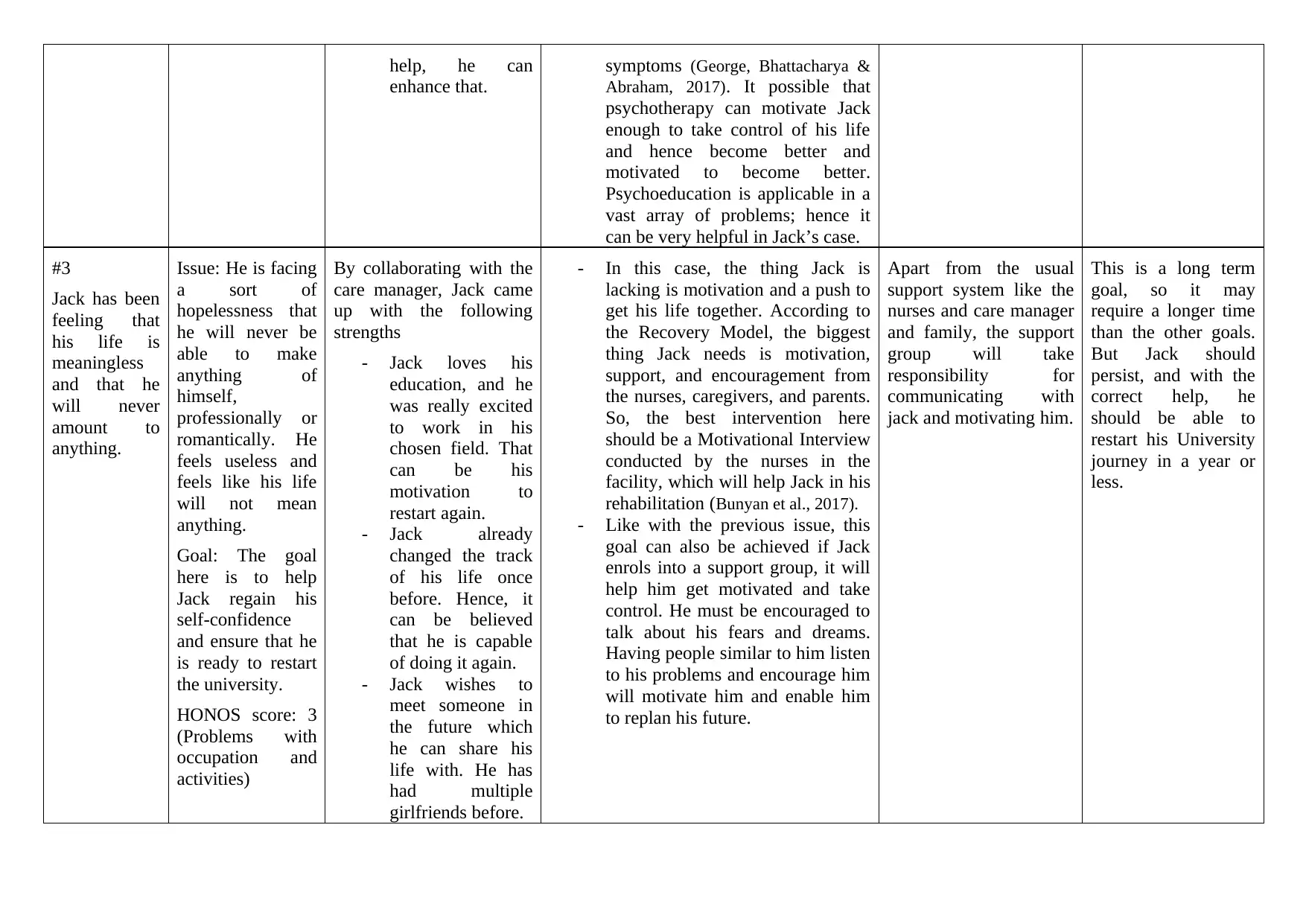
help, he can
enhance that.
symptoms (George, Bhattacharya &
Abraham, 2017). It possible that
psychotherapy can motivate Jack
enough to take control of his life
and hence become better and
motivated to become better.
Psychoeducation is applicable in a
vast array of problems; hence it
can be very helpful in Jack’s case.
#3
Jack has been
feeling that
his life is
meaningless
and that he
will never
amount to
anything.
Issue: He is facing
a sort of
hopelessness that
he will never be
able to make
anything of
himself,
professionally or
romantically. He
feels useless and
feels like his life
will not mean
anything.
Goal: The goal
here is to help
Jack regain his
self-confidence
and ensure that he
is ready to restart
the university.
HONOS score: 3
(Problems with
occupation and
activities)
By collaborating with the
care manager, Jack came
up with the following
strengths
- Jack loves his
education, and he
was really excited
to work in his
chosen field. That
can be his
motivation to
restart again.
- Jack already
changed the track
of his life once
before. Hence, it
can be believed
that he is capable
of doing it again.
- Jack wishes to
meet someone in
the future which
he can share his
life with. He has
had multiple
girlfriends before.
- In this case, the thing Jack is
lacking is motivation and a push to
get his life together. According to
the Recovery Model, the biggest
thing Jack needs is motivation,
support, and encouragement from
the nurses, caregivers, and parents.
So, the best intervention here
should be a Motivational Interview
conducted by the nurses in the
facility, which will help Jack in his
rehabilitation (Bunyan et al., 2017).
- Like with the previous issue, this
goal can also be achieved if Jack
enrols into a support group, it will
help him get motivated and take
control. He must be encouraged to
talk about his fears and dreams.
Having people similar to him listen
to his problems and encourage him
will motivate him and enable him
to replan his future.
Apart from the usual
support system like the
nurses and care manager
and family, the support
group will take
responsibility for
communicating with
jack and motivating him.
This is a long term
goal, so it may
require a longer time
than the other goals.
But Jack should
persist, and with the
correct help, he
should be able to
restart his University
journey in a year or
less.
enhance that.
symptoms (George, Bhattacharya &
Abraham, 2017). It possible that
psychotherapy can motivate Jack
enough to take control of his life
and hence become better and
motivated to become better.
Psychoeducation is applicable in a
vast array of problems; hence it
can be very helpful in Jack’s case.
#3
Jack has been
feeling that
his life is
meaningless
and that he
will never
amount to
anything.
Issue: He is facing
a sort of
hopelessness that
he will never be
able to make
anything of
himself,
professionally or
romantically. He
feels useless and
feels like his life
will not mean
anything.
Goal: The goal
here is to help
Jack regain his
self-confidence
and ensure that he
is ready to restart
the university.
HONOS score: 3
(Problems with
occupation and
activities)
By collaborating with the
care manager, Jack came
up with the following
strengths
- Jack loves his
education, and he
was really excited
to work in his
chosen field. That
can be his
motivation to
restart again.
- Jack already
changed the track
of his life once
before. Hence, it
can be believed
that he is capable
of doing it again.
- Jack wishes to
meet someone in
the future which
he can share his
life with. He has
had multiple
girlfriends before.
- In this case, the thing Jack is
lacking is motivation and a push to
get his life together. According to
the Recovery Model, the biggest
thing Jack needs is motivation,
support, and encouragement from
the nurses, caregivers, and parents.
So, the best intervention here
should be a Motivational Interview
conducted by the nurses in the
facility, which will help Jack in his
rehabilitation (Bunyan et al., 2017).
- Like with the previous issue, this
goal can also be achieved if Jack
enrols into a support group, it will
help him get motivated and take
control. He must be encouraged to
talk about his fears and dreams.
Having people similar to him listen
to his problems and encourage him
will motivate him and enable him
to replan his future.
Apart from the usual
support system like the
nurses and care manager
and family, the support
group will take
responsibility for
communicating with
jack and motivating him.
This is a long term
goal, so it may
require a longer time
than the other goals.
But Jack should
persist, and with the
correct help, he
should be able to
restart his University
journey in a year or
less.
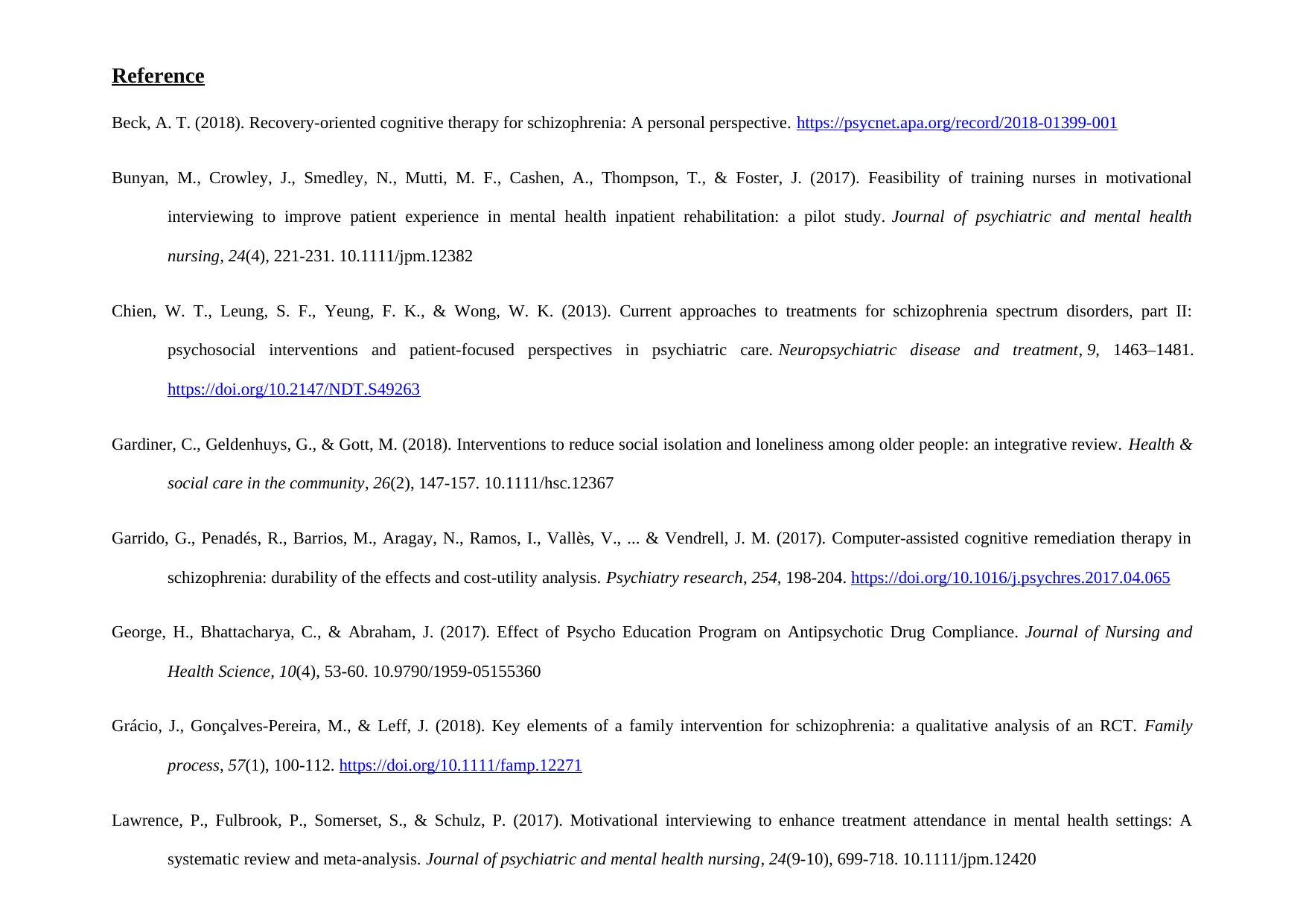
Reference
Beck, A. T. (2018). Recovery-oriented cognitive therapy for schizophrenia: A personal perspective. https://psycnet.apa.org/record/2018-01399-001
Bunyan, M., Crowley, J., Smedley, N., Mutti, M. F., Cashen, A., Thompson, T., & Foster, J. (2017). Feasibility of training nurses in motivational
interviewing to improve patient experience in mental health inpatient rehabilitation: a pilot study. Journal of psychiatric and mental health
nursing, 24(4), 221-231. 10.1111/jpm.12382
Chien, W. T., Leung, S. F., Yeung, F. K., & Wong, W. K. (2013). Current approaches to treatments for schizophrenia spectrum disorders, part II:
psychosocial interventions and patient-focused perspectives in psychiatric care. Neuropsychiatric disease and treatment, 9, 1463–1481.
https://doi.org/10.2147/NDT.S49263
Gardiner, C., Geldenhuys, G., & Gott, M. (2018). Interventions to reduce social isolation and loneliness among older people: an integrative review. Health &
social care in the community, 26(2), 147-157. 10.1111/hsc.12367
Garrido, G., Penadés, R., Barrios, M., Aragay, N., Ramos, I., Vallès, V., ... & Vendrell, J. M. (2017). Computer-assisted cognitive remediation therapy in
schizophrenia: durability of the effects and cost-utility analysis. Psychiatry research, 254, 198-204. https://doi.org/10.1016/j.psychres.2017.04.065
George, H., Bhattacharya, C., & Abraham, J. (2017). Effect of Psycho Education Program on Antipsychotic Drug Compliance. Journal of Nursing and
Health Science, 10(4), 53-60. 10.9790/1959-05155360
Grácio, J., Gonçalves‐Pereira, M., & Leff, J. (2018). Key elements of a family intervention for schizophrenia: a qualitative analysis of an RCT. Family
process, 57(1), 100-112. https://doi.org/10.1111/famp.12271
Lawrence, P., Fulbrook, P., Somerset, S., & Schulz, P. (2017). Motivational interviewing to enhance treatment attendance in mental health settings: A
systematic review and meta‐analysis. Journal of psychiatric and mental health nursing, 24(9-10), 699-718. 10.1111/jpm.12420
Beck, A. T. (2018). Recovery-oriented cognitive therapy for schizophrenia: A personal perspective. https://psycnet.apa.org/record/2018-01399-001
Bunyan, M., Crowley, J., Smedley, N., Mutti, M. F., Cashen, A., Thompson, T., & Foster, J. (2017). Feasibility of training nurses in motivational
interviewing to improve patient experience in mental health inpatient rehabilitation: a pilot study. Journal of psychiatric and mental health
nursing, 24(4), 221-231. 10.1111/jpm.12382
Chien, W. T., Leung, S. F., Yeung, F. K., & Wong, W. K. (2013). Current approaches to treatments for schizophrenia spectrum disorders, part II:
psychosocial interventions and patient-focused perspectives in psychiatric care. Neuropsychiatric disease and treatment, 9, 1463–1481.
https://doi.org/10.2147/NDT.S49263
Gardiner, C., Geldenhuys, G., & Gott, M. (2018). Interventions to reduce social isolation and loneliness among older people: an integrative review. Health &
social care in the community, 26(2), 147-157. 10.1111/hsc.12367
Garrido, G., Penadés, R., Barrios, M., Aragay, N., Ramos, I., Vallès, V., ... & Vendrell, J. M. (2017). Computer-assisted cognitive remediation therapy in
schizophrenia: durability of the effects and cost-utility analysis. Psychiatry research, 254, 198-204. https://doi.org/10.1016/j.psychres.2017.04.065
George, H., Bhattacharya, C., & Abraham, J. (2017). Effect of Psycho Education Program on Antipsychotic Drug Compliance. Journal of Nursing and
Health Science, 10(4), 53-60. 10.9790/1959-05155360
Grácio, J., Gonçalves‐Pereira, M., & Leff, J. (2018). Key elements of a family intervention for schizophrenia: a qualitative analysis of an RCT. Family
process, 57(1), 100-112. https://doi.org/10.1111/famp.12271
Lawrence, P., Fulbrook, P., Somerset, S., & Schulz, P. (2017). Motivational interviewing to enhance treatment attendance in mental health settings: A
systematic review and meta‐analysis. Journal of psychiatric and mental health nursing, 24(9-10), 699-718. 10.1111/jpm.12420
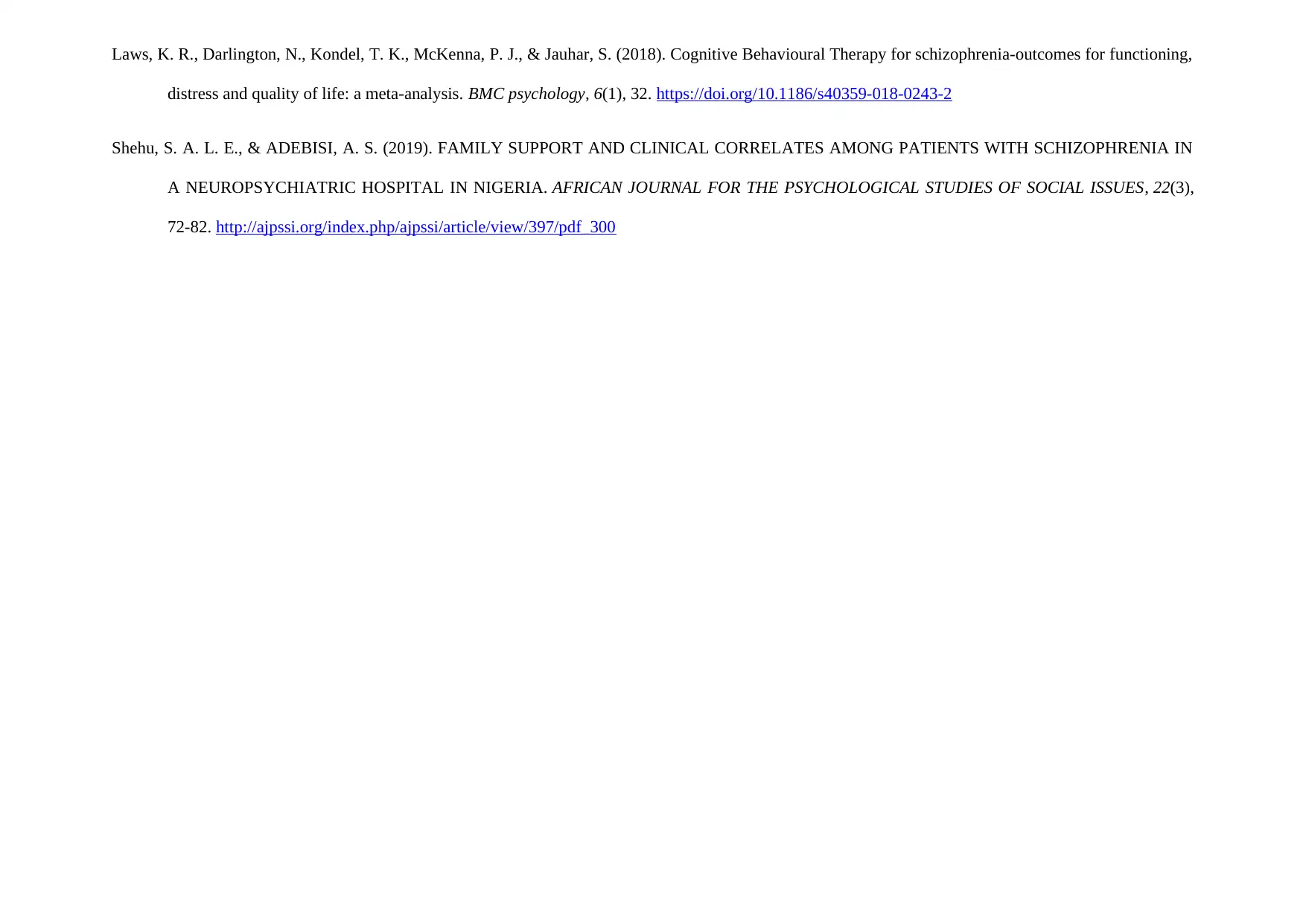
Laws, K. R., Darlington, N., Kondel, T. K., McKenna, P. J., & Jauhar, S. (2018). Cognitive Behavioural Therapy for schizophrenia-outcomes for functioning,
distress and quality of life: a meta-analysis. BMC psychology, 6(1), 32. https://doi.org/10.1186/s40359-018-0243-2
Shehu, S. A. L. E., & ADEBISI, A. S. (2019). FAMILY SUPPORT AND CLINICAL CORRELATES AMONG PATIENTS WITH SCHIZOPHRENIA IN
A NEUROPSYCHIATRIC HOSPITAL IN NIGERIA. AFRICAN JOURNAL FOR THE PSYCHOLOGICAL STUDIES OF SOCIAL ISSUES, 22(3),
72-82. http://ajpssi.org/index.php/ajpssi/article/view/397/pdf_300
distress and quality of life: a meta-analysis. BMC psychology, 6(1), 32. https://doi.org/10.1186/s40359-018-0243-2
Shehu, S. A. L. E., & ADEBISI, A. S. (2019). FAMILY SUPPORT AND CLINICAL CORRELATES AMONG PATIENTS WITH SCHIZOPHRENIA IN
A NEUROPSYCHIATRIC HOSPITAL IN NIGERIA. AFRICAN JOURNAL FOR THE PSYCHOLOGICAL STUDIES OF SOCIAL ISSUES, 22(3),
72-82. http://ajpssi.org/index.php/ajpssi/article/view/397/pdf_300
1 out of 7
Related Documents
Your All-in-One AI-Powered Toolkit for Academic Success.
+13062052269
info@desklib.com
Available 24*7 on WhatsApp / Email
![[object Object]](/_next/static/media/star-bottom.7253800d.svg)
Unlock your academic potential
© 2024 | Zucol Services PVT LTD | All rights reserved.




